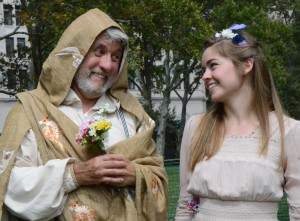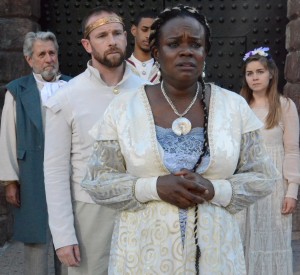Shakespeare’s late romance The Winter’s Tale poses two huge challenges to any director. One is that Leontes, the king of Sicilia who has been hosting his bosom buddy Polixenes, king of Bohemia, for nine months, suddenly and without reason suspects his queen, Hermione, of adultery with his old friend. The other is a jump in time between the first three acts—steeped in tragedy—to a fourth act of pastoral comedy, and a last act of redemption. Director Eric Tucker’s production of The Winter’s Tale for Bedlam seems to have taken its approach from the company’s title: it’s almost all bedlam.
A Civic Jewel—and Free!
There is something appropriate about offering Shakespeare for free in the parks of New York City. Like the great rivers and mountains of the earth or the stars and planetary system—which charge no admission for us to admire them—Shakespeare is a force of Nature that belongs to us all.
Artistic Director Stephen Burdman has made it the mission of the New York Classical Theatre to bring free Shakespeare productions to various parks during the summer: following this year’s production of A Midsummer Night’s Dream is the late romance The Winter’s Tale, brilliantly conceived, acted, and deeply moving, to boot.
The Winter’s Tale, first performed 405 years ago in 1611, is about the fallout of a king’s jealousy when the ruler, Leontes, wrongly imagines that his devoted wife, Hermione, has consorted with his best friend, King Polixenes, and that the child she is to bear him is not his. Only after the death of Leontes’ young son and sole heir, Mamillius (Peyton Lusk is delightful in the role), followed by the death of his faithful queen, does the king awaken from his madness and see his foul crimes for what they are.
Here is a feast of self-deception, delusion and jealousy for Shakespeare to plumb in all of the pity and horror his majestic language can inspire before the play resolves, after an improbable leap of 16 years in time, on happier notes: the reunion of the two friends, Leontes and Polixenes; the forthcoming marriage of their children, Florizel and Perdita; and most ridiculously wondrous of all, the revelation that the statue of the long-dead queen is really a living and breathing Hermione, now returned to the bosom of her husband and family. If the question is whether or to what extent a particular performance of The Winter’s Tale allows the audience to utterly suspend their disbelief when confronted by such leaps in time and “happy” endings, the production did very well indeed.
Brad Fraizer in his beautifully acted role as Leontes carries the emotional sweep of the play from his increasingly insane jealousy to the extremes and horror of recognition of his crimes, and from there to the reconciliations wrought by Time and Chance. It is a challenging role.
David Heron as his beloved childhood friend, King Polixenes, is commanding and passionate in his role. Hermione, so profoundly wronged by her husband, is portrayed by Mairin Lee with a queenly elegance, dignity and sensitivity. Mark August, who plays the clown, Autolycus, is extraordinary and deserves special mention for his comic brilliance and gifts. So, too, does the stirring performance of Lisa Tharp as Paulina, maid in waiting to the Queen, whose impassioned rebuke to Leontes for his treatment of his wife is heart-piercing. For all of the loveliness of the outdoor setting, it also places special demands in clearly projecting Shakespeare’s language, to which the cast rose magnificently.
As the play moves from Act II to Act III, the audience also moves—from Clinton Castle (Leontes’ court in Sicilia) to a lawn overlooking the Hudson River (the shores of Bohemia). Burdman calls this his “panoramic” technique, a method by which the audience is less a witness to the actions before it than at the center of those actions. It is as if the viewers were really accompanying the courtier Antigonus, sent by the mad Leontes to abandon his own newborn daughter, Perdita. Over the Hudson, just in front of the audience, is a real cloud-flecked sky with real birdsong mixing with the sounds of the city in the background. Scene iii of the next act takes place on a different lawn (another location in Bohemia) to which the actors, again, lead the audience. The scene is one of a sheep shearing and, as evening gathers, the audience sits amid trees and grass exactly as they might at a real sheep shearing.
In Burdman’s “panoramic” approach, the entire park is our stage. There are no sets. Scenes are acted in different areas of the park with the audience sitting on the ground or grass, and the staff, in the first row of the audience, shining flashlights on the characters once it has become dark. Shakespeare’s language and his dramatic exploration of human character and heart fill the entirety of the space with no theatrical paraphernalia to draw off attention. And the effect is simply stunning, as less proves so much more! There is no lovelier way to spend an evening than to allow Shakespeare’s magic to sizzle and cast a net over you and over the city itself.
Meet outside Castle Clinton in Battery Park at 7 p.m. nightly (except Thursdays) through Aug. 7 (via 1 train to South Ferry or the 4/5 to Bowling Green). The Winter’s Tale will then move to Brooklyn Bridge Park from Aug. 9-14 (take F train to York, 2/3 to Clark or A/C to High), also at 7 p.m. There will be no performance on Aug. 11.
A Chilly Romance
Shakespeare’s late play The Winter’s Tale has always presented directors with difficulties, notably that Leontes, the Sicilian king who dominates the first half, becomes insanely jealous of the friendship of his pregnant queen, Hermione, and his best friend, Polixenes, king of Bohemia, some nine months after Polixenes has arrived for a visit. Indeed, on the eve of Polixenes’ departure, Leontes determines to kill his friend, who escapes. When Hermione delivers, Leontes orders the death of the newborn. He then learns of her innocence just as her death is reported.
Michael Sexton’s production for the Pearl Theatre Company is stuffed with ideas, to mixed effect. In a first scene whose meta-theatricality is echoed later, the actors saunter on and tacitly acknowledge the audience before getting down to toasts, card tricks, and pouring Scotch. In short order, Peter Francis James’s well-spoken Leontes begins to voice his suspicions of the infidelity of Hermione (Jolly Abraham). James stands stiffly with his hands in his pockets, seemingly tight with emotion. If James cannot quite make Leontes’ jealousy credible, he suggests one of those people who snap suddenly and inexplicably kill their families. He tries to enlist his chief counselor, Camillo (an authoritative Tom Nelis), to poison Polixenes (Bradford Cover), but Camillo warns Polixenes and joins him in his escape.
Sexton has made judicious cuts, and some of his ideas are nifty. How does one approach Shakespeare’s most famous stage direction, Exit, pursued by a bear? It occurs when the courtier Antigonus (Dominic Cuskern) takes Hermione’s infant to the woods to dispose of it. Sexton’s solution is to have a visible attack and a stylish feeding frenzy. As one actor holds up a mounted bear’s head, several other actors, clad in fur coats, move as in a choreographed Noh drama and disembowel Antigonus (red cloths fly into the air).
Still, there's a disconcerting tricksiness to everything. Why does Bradley King (with the director’s blessing, surely) suddenly illuminate the actors as if they were in a 19th-century melodrama? Or a 1940s film noir? When the Shepherd enters, the lights go up, and his scene starts from the audience for no apparent reason.
But a closet door serves as an antechamber to the court, a prison cell, an actual closet, and later a bizarre exit for the comic rascal Autolycus (Steve Cuiffo). At times one longs for an oral description of the setting akin to those supplied by the mechanicals in A Midsummer Night’s Dream: “In this same interlude it doth befall/That I, one Snout by name, present a wall/And such a wall as I would have you think/That had in it a crannied hole or chink…”
It has often been difficult to spark interest in the wooing of the grown Perdita (Imani Jade Powers) by Polixenes’ son Florizel (James Udom), and the actors here don’t overcome the problem. But Rachel Botchan as Hermione's lady-in-waiting Paulina, who becomes the conscience of the reformed Leontes, is excellent.
The final scene, in which Hermione’s statue comes to life and is reunited with a repentant Leontes, is written to produce sniffles at a minimum. Here, Hermione appears without "statue" makeup, as if she's just a woman standing still. There's no magic, no wonder or warmth, and the scene is played so lethargically, to a lightly plunked guitar, that the climax dwindles away. It’s a shame that a production that often wrestles interestingly with this tragicomedy should end so weakly.
Evening performances of The Winter's Tale are 7 p.m. on Tuesdays and 8 p.m. Thursday through Saturday. Matinees are at 2 p.m. Wednesdays, Saturdays, and Sundays through March 15. Tickets may be purchased by visiting pearltheatre.org or calling (212) 563-9261.











